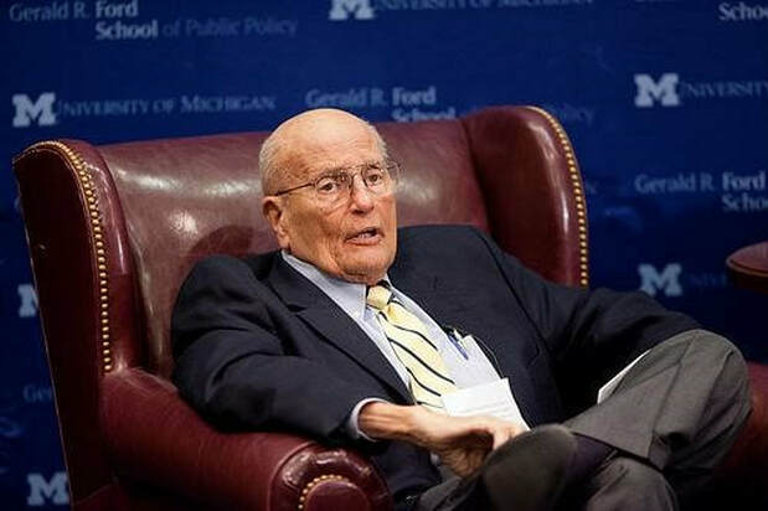Nobody understands how the hell this is going to be addressed. This is one of the most complex scientific problems that we’ve got in the world. – John Dingell
Politics like most of life moves in a circle. I was reminded of this the other day when Senator Markey (D-MA) and Congresswoman Ocasio-Cortez (D-NY) stepped onto the Congressional stage to announce their proposed Green New Deal Resolution on the day John Dingell, Jr. died. A decade ago Dingell, Markey, and Speaker Pelosi were the actors in a different production. As the 111th Congress got underway, a fight over the leadership of the House Energy and Commerce Committee was going on. Speaker Pelosi and Congressman Dingle had different ideas of national environmental policy. While Dingell fought to keep his chairmanship—a position he held from 1981-1995 and again for the two years of the 110th Congress—Pelosi wanted a change.
Dingell was a genuine force of nature throughout his nearly sixty years on Capitol Hill. The Congressional scholar Norman Ornstein wrote:
Dingell has had a hand—a hugely constructive hand—in nearly every major advance in social policy over the past five-plus decades, including civil and voting rights, health, and the environment.
Although proudest of his role in the passage of the Civil Rights Act (1964), his environmental record is impressive by any standard. He either wrote or was instrumental in the passage of the: National Wilderness Act (1964); Water Quality Act (1965); National Environmental Policy Act; Endangered Species Act (1973); Natural Gas Policy Act (1978); Clean Air Act Amendments (1990); and Energy Independence and Security Act (2007). Dingell also took pride in having had his hands in the passage of Medicare and Medicaid. He was a supporter of single-payer healthcare long before Medicare for all.
Dingell used his power as Chair of the Energy and Commerce Committee to investigate irregularities at EPA during Anne Gorsuch’s ill-fated term as Administrator. Dubbed Sewergate, by the press, the incident involved the misuse of Superfund dollars by Rita Lavelle. Lavelle was indicted for contempt of Congress and ultimately served a year in prison on one count of wire fraud and two counts of lying to the FBI. Others he took down included Mike Deaver, a top Republican strategist for lying under oath and Stanford President Donald Kennedy for using federal grants to help pay for a 72-foot yacht.
A day before he died Dingell dictated a letter to his wife—the current member of a clan serving in House since Dingell, Sr. was elected in 1933. The Washington Post ran the letter My last words for America. Many of those words focused on today’s politics and the environment.
In the letter, Mr. Dingell recounted
not five decades ago, much of the largest group of freshwater lakes on Earth –our own Great Lakes — were closed to swimming and fishing and other recreational pursuits because of chemical and bacteriological contamination from untreated industrial and wastewater disposal.
We regularly used and consumed foods, drugs, chemicals and other things (cigarettes) that were legal, promoted and actively harmful. Hazardous wastes were dumped on empty plots in the dead of night. There were few if any restrictions on industrial emissions. We had only the barest scientific knowledge of the long-term consequences of any of this.
It was with pride that the Congressman noted that the challenges he spoke of were addressed by Congress. It was also a message. He recognized the strong link between environmental and social justice like the current members of Congress who stood in the shadow of the Capitol to announce the release of the Green New Deal Resolution:
And there was a great stain on America, in the form of our legacy of racial discrimination. There were good people of all colors who banded together, risking and even losing their lives to erase the legal and other barriers that held Americans down. In their time, they were often demonized and targeted, much like other vulnerable men and women today.
Not everything Mr. Dingell did over the course of his Congressional career was good for the environment. A staunch supporter of the auto industry—often called Mr. Auto or Mr. Truck by his colleagues and constituents—Dingell fought long and very hard against provisions in the Clean Air Act (CAA), and other legislation he believed would raise the prices of new cars. Dingell’s interest in shielding the auto industry went so far as to suggest that California’s waiver under the CAA to set more strident vehicle fuel efficiency standards should be retracted. His protection of Detroit’s major industry did not please Madame Speaker.
The transportation sector is the single biggest emitter of greenhouse gases (GHGs). The first fuel efficiency standards were part of the Energy Policy and Conservation Act of 1975 (EPCA). Think of how much more time the world would now have to reduce emissions to net zero had more strident standards been part of the EPCA or again as part of the Energy Independence and Security Act of 2007 (EISA)?
In 2007, the year Pelosi first became Speaker, she and Dingell battled over her creating a Select Committee on Energy Independence and Global Warming. Dingell, like senior House Democrats today, didn’t cotton to the idea of having someone else’s committee—select or otherwise—shadowing Energy and Commerce.
Back in the day, House committee chairs were more powerful than they are today. Dingell carved out a broad policy swath for the committee to oversee—often quoted as saying: If it moves, it’s energy, and if it doesn’t, it’s commerce. Dingell ruled the committee with an iron hand. Jack Anderson, the Pulitzer prized columnist, considered the father of investigative journalism, had another name for Mr. Auto–Mr. Mean. The Detroit Press had another name for Mr. Auto and Mr. Mean–Mr. Junkyard Dog. His nom de guerre was a term of endearment in Michigan.
The Select Committee was chaired by then-Congressman Markey (D-MA). Its work resulted in a cap-and-trade bill (Waxman-Markey). The bill was made part of the American Clean Energy and Security Act of 2009 (ACES), but not before Dingell lost his chairmanship of the Energy and Commerce Committee in 2009 to Henry Waxman (D-CA)—with help from Madame Speaker.
The bill narrowly passed the House but never made onto the floor of the Democratic Senate. Democratic opposition to cap-and-trade remains today. Its defeat is said to have left an indelible mark on Speaker Pelosi’s mind and partially responsible for the tack she has taken on the current Special Climate Crisis Committee and will take over the term of the 116th Congress.
The battles between Chairman Dingell and Speaker Pelosi were storied. He was an old school union Democrat from the Rust Belt, she a coastal liberal. His constituents were losing their jobs to technology and lower-cost foreign manufacturers in Asia and Germany. Her constituents were the leading edge of technology prospering both economically and politically.
Despite the very real differences between Dingell and Pelosi, he not only voted in favor of ACES and its cap-and-trade provisions, he joined Waxman, Markey, and Bouchard (D-VA) in a letter to Obama hoping he would help move the bill through the Senate. In the letter the Congressmen wrote:
We represent different regions of the country and approach energy issues from different perspectives, but we are united in the view that now is the time for Congress to pass energy and climate legislation.
On his passing Senator Markey tweeted a tribute to The Dean, as did many who served with him in the House. AOC (D-NY) graciously acknowledged the Congressman’s healthcare legacy to her millions of Twitter followers—some whom I would imagine may only be vaguely aware of who Dingell was and his championing of environmental defense.
 I wonder how AOC and supporters like the Sunrise Movement and The Climate Mobilization would relate to Mr. Auto-Mean-Junkyard Dog–if he were in Congress today? Would they shun him because of his stance on auto emissions—dismissing his considerable contributions? Would they embrace him for his power, influence, quarter-million followers on Twitter, and loathing of Trump? The Congressman called Old 45 an “orange son of a bitch” in his memoir and continued to mock him right up to the end. (See his Jan 14 tweet)
I wonder how AOC and supporters like the Sunrise Movement and The Climate Mobilization would relate to Mr. Auto-Mean-Junkyard Dog–if he were in Congress today? Would they shun him because of his stance on auto emissions—dismissing his considerable contributions? Would they embrace him for his power, influence, quarter-million followers on Twitter, and loathing of Trump? The Congressman called Old 45 an “orange son of a bitch” in his memoir and continued to mock him right up to the end. (See his Jan 14 tweet)
It’s good to remember that The Dean was not always The Dean. He came into Congress like every freshman—basically at the bottom of the Congressional totem. Over the course of five decades, he emerged as one of the most powerful committee chairmen ever to serve in Congress. Energy and Commerce had the largest budget and staff of any in the House and touched 40 percent of all House bills. Today the room in which the Committee meets bears his name.
In 2009, a new force in Congress was gaining control. Speaker Pelosi and members of the liberal California delegation prevailed in the closed vote that gained Henry Waxman the chair of the Committee and Congressman Markey the chair of the newly organized Energy and Environment Subcommittee. Given the honorary title of Chairman Emeritus, Dingell took his defeat graciously.
When the time came, Dingell supported the Waxman-Markey bill. He understood the importance of loyalty and that serving his constituents meant making alliances—sometimes with those you do not entirely agree.
There are times when politicians may rightly be accused of short attention spans, but one should always remember they have long memories. Politics like most of life does indeed move in a circle. What goes around comes around.
The Dean will be missed, but his legacy stands as a lesson to all who roam about the halls of power. Finally, in his own words:
A lot of damage has been done to our fragile republic. Repairing that damage won’t take months or even years. It will take decades, if not generations, to pull our deeply divided nation together again. … We now find ourselves on the precipice of a great cliff. Our next step is either into the abyss or toward a higher moral ground. It’s up to you, my dear friends.
Lead Image: Grist
Ed. note: You can find Joel’s latest podcast here.







